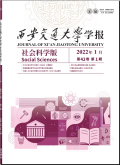西安交通大学学报(社会科学版)2024,Vol.44Issue(1):62-73,12.DOI:10.15896/j.xjtuskxb.202401007
官员对民众信任的形成机制:文化主义视角下多元因素的解释
Formation Mechanisms of Public Administrators'Trust in Citizens:An Explana-tory Framework from a Cultural Perspective
摘要
Abstract
The mutual trust between the government and citizens is important for their relationship.In particular,public administrators'trust in citizens directly affects their willingness to listen to and adopt citizens'ideas.However,the research on trust in citizens currently is insufficient. This article develops a cultural framework and tests the hypotheses with data from about 4,000 public administrators.The results show that Chinese public administrators'trust in citizens on average is at a moderate level.From a cultural perspective,we focus on three types of independent variables:cultural traits in terms of public administrators'personality and values,public administrators'identification with society and culture,and the channels through which public administrators receive information about society and culture. The results of the regression analysis show that Chinese public administrators'trust in citizens is positively influenced by their propensity to trust,public service motivation,belief in paternalistic leadership,and the use of traditional media for information access.At the same time,it is negatively influenced by public administrators'hierarchical orientation,face-saving,and the use of internet-based media for information access.Overall,culture is an important source of public administrators'trust in citizens. The research question in this article has both theoretical value and policy implications.On the one hand,public administrators'trust in citizens is an important concept in the field of democratic governance and citizen participation,but the research is still in its infancy domestically and internationally.On the other hand,trust in citizens is one of the micro-psychological foundations of macro policy discourses such as adhering to the mass line,developing the whole-process people's democracy,and building a service-oriented government that the people are satisfied with.Research on these policy discourses has been largely normative and at the macro level. This paper uses the perspective of culturalism to expand the study of public administrators'trust in citizens from three aspects.First,important public management variables such as public service motivation and information access have been included in the analysis;second,some important cultural contextual variables were included in the analysis,especially beliefs in paternalistic leadership,administrators'hierarchical orientation,and face-saving,which are closely related to the Confucian tradition;third,a nationwide sample is used to test the hypothesis in a larger geographical range and with more types of public administrators. This article has implications for the construction of China's independent knowledge system of public administration.It not only expands the theoretical perspectives and explanatory variables in general but also incorporates variables with Chinese characteristics that are directly related to Chinese culture.Through the study of the formation mechanism of public administrators'trust in citizens,this paper helps discover and explain the action-level micro-mechanism of Chinese modernization.关键词
政民关系/政治信任/信任倾向/公共服务/官员的民众信任/文化主义/治理效能Key words
the relationship between government and citizens/political trust/propensity to trust/public services/public administrators'trust in citizens/culturalism/governance effectiveness分类
社会科学引用本文复制引用
杨开峰,郑连虎..官员对民众信任的形成机制:文化主义视角下多元因素的解释[J].西安交通大学学报(社会科学版),2024,44(1):62-73,12.基金项目
国家自然科学基金项目(72342010). (72342010)

